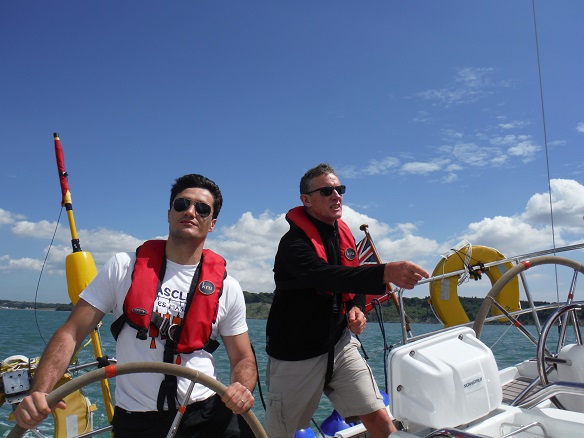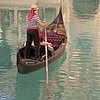
Yachtmaster Offshore Practical Course
Starting from: £947pp (3-1 ratio)
Safe & Secure Checkout
The Yachtmaster Offshore Practical Course is a prep week designed to bring experienced sailors up to speed before taking the RYA/MCA Yachtmaster Offshore Certificate of Competence exam (included on this programme).
- Covers Yachtmaster prep, and the exam
- Complete Yachtmaster Offshore guidance from expert instructors
- Taken over 5 days - 3 days prep and 2 days exam
Safe & Secure Checkout
YM Offshore Prep
Training was serious and high quality. Trainer really put in a lot of effort.

Tobias, Germany
Verified Customer
There's no set syllabus for the course. It is about practicing for the RYA/MCA Yachtmaster Offshore Certificate of Competence exam, tweaking your technique and perhaps ironing out any bad habits you may have picked up. The exam will assess your boat handling and skippering skills, including navigation, sailing ability, seamanship, safety awareness, and knowledge of signals and meteorology.
An external examiner will come on board on the penultimate day of the course, and you will be examined through the evening and some of the next day. Passing the Yachtmaster Offshore exam proves your proficiency up to 150 miles offshore, and is recognised worldwide.
Please note that the RYA exam fee is paid directly to the RYA (we will send you details of how to pay) and is not included in the course fee.
You need 2500 miles to take the YM Offshore exam. It's also recommended that you first take the Yachtmaster Theory Course to build upon your knowledge of advanced navigation techniques.

5.0 based on 496 Happy Customers on Tripadvisor
RYA-certified sailing courses

5.0 based on 220 Happy Customers on Google Reviews
Check out our Podcasts
The podcasts below will give you an insight in to what to expect on the Yachtmaster prep course. 2 are by an examiner. The third is from a student's point of view.
Click to load Spotify podcast
Course podcast episode
Click to load Spotify podcast
Course podcast episode
Click to load Spotify podcast
Course podcast episode
More Info on the RYA Yachtmaster Offshore Course
Low student to instructor ratios: Our low student to instructor ratios mean that each student receives ample guidance and support during their sailing experience.
All meals included on-board: Enjoy hassle-free trips with all meals provided on-board. From hearty breakfasts to satisfying dinners. Students can focus on the experience without worrying about extra expenses.
Wet weather gear included: Be prepared for any conditions with the use of our wet weather gear. Whether it’s rain or wind, stay comfortable and protected during your outdoor activities with quality gear provided at no additional cost.
Friendly experienced instructors: Learn from the best with our team of friendly and experienced instructors. With a wealth of knowledge and a passion for teaching, our instructors are dedicated to creating a supportive and enjoyable learning environment for students of all skill levels.
Key Course Details
Here’s a breakdown of the most important information about the Yachtmaster Offshore Practical Course:
Required Experience
- 50 days
- 5 days as skipper
- 5 passages over 60nm, 2 overnight and 2 as skipper
- 2500 miles
- Minimum Age = 18
Course Duration
- 5 consecutive days
- 3 days of Prep
- 2 days of the exam
Course Content
- Practise, practise, practise.
- 3-days preparation for the Yachtmaster Offshore exam
- Followed by the Yachtmaster Offshore exam on the final 2 days
Skills Gained
- A successful candidate will have reached a high level of skippering skills, boat handling, general seamanship, navigation, safety awareness and knowledge of IRPCS, meteorology and signals.
- An RYA Yachtmaster Offshore Certificate of Competence - regarded by many to be the pinnacle of yachting qualifications.
Get Started In 3 Easy Steps
We make learning to be a Yachtmaster Offshore easy.
Select A Date
Once you’re sure you meet the requirements, look at our upcoming course dates and choose the one that best suits you.
Take The Course
Enjoy the prep days getting up to speed for the exam..
Become A Pro Sailor
Take the exam and assuming all goes well you can feel incredibly proud to now be an RYA Yachtmaster Offshore!
RYA Yachtmaster Offshore Prep Course -
Complete Breakdown
Prepare and Practice for the RYA/MCA Yachtmaster Offshore Certificate of Competence exams.
The instructor will help you to ensure you are as prepared as possible by focusing on the areas you need most improvement and ironing out any bad habits you may have. You will be pushed hard. You will enter and leave as many ports/harbours as possible. You will practice night sailing and blind navigation. You will go over all the lights, shapes, sound signals and collision regulations. It is not a requirement to do such a course before the exam however it is well worth doing it if only to find out your strengths and weaknesses.
A Yachtmaster Offshore should be able to enter any well-charted harbour for the first time, with sufficient depth, by day or night.
You will sail mainly in the Solent and will visit as many places as possible so that you are familiar with them before the exam.
The Solent is a great place to do you Yachtmaster Offshore. The mix of interesting tides, plenty of varied traffic and number of ports and harbours means you know you will be tested thoroughly in these waters.
Minimum Pre exam for the experience for the Yachtmaster Offshore
Sea time: To be eligible for this exam you must have at least 50 days' sea time (5 as skipper), logged 2500 nautical miles, 5 passages over 60nm including 2 overnight and 2 as skipper - all within the last ten years.
Half the qualifying sea time must have been conducted in tidal waters & on a sailing vessel 24M or under. For information on what constitutes tidal miles have a look at this blog.
If you need more miles then have a look here for some ideas on how to build more miles or here
Certificates required:
- A VHF radio licence
- First aid certificate
- A Sound knowledge of using a Radar with plotting sheets.
These can each be obtained on a one-day course.
Minimum age: 18
The Exam
The Yachtmaster Offshore exam will take about 8 to 12 hours for one candidate and 10 to 18 hours for two. Candidates will be set tasks to demonstrate their ability as skipper of an offshore cruising yacht and may also be asked questions on any part of the syllabus for all courses except Yachtmaster Ocean.
Examiners are independent assessors not involved in training candidates and are therefore objective when assessing ability. The RYA examines candidates on behalf of the UK Maritime and Coastguard Agency.
The RYA examiner will meet you onboard and talk through the plan. Examiners understand you could be nervous and will do their best to allay your fears and make sure you are clear about what they want you to do. They are there to find out what you can do, not to pick holes.
Please note that the exam fee is paid directly to the RYA (we will send you details of how to pay) and is not included in the course fee.
RYA Certificates of Competence
A good skipper leads the crew and communicates with them, making sure they understand what is going on and listening to them when they have something to say. They do not shout a stream of commands, leaving their crew in a quivering mess. Quiet competence instils confidence, helping your crew feel safe in the knowledge that the right decisions are being made.
There are three RYA Certificates of Competence:
Yachtmaster Coastal Certificate of Competence
Yachtmaster Offshore Certificate of Competence
Yachtmaster Ocean Certificate of Competence
The theory is the same for Yachtmaster Coastal and Yachtmaster Offshore. The difference is that less practical experience is required for the Coastal exam. The Yachtmaster Ocean involves astronavigation. See the details for the shorebased course Here.
Certificates of competence are some of the most useful and credible of yachting qualifications. They thoroughly test the skipper's ability, and can therefore appear daunting to potential candidates. But well prepared skippers with the right experience needn't worry. With the practice and preparation you get from doing the prep course, you should be able to relax sufficiently to let your skills shine through any exam nerves.
Accommodation
Accommodation during a sailing course is on board the yacht. There are almost always three double cabins and two single berths in the saloon which provide accommodation for eight people. However, there would only ever be a maximum of three students on board, plus the instructor.
Showers/Facilities
Whilst we do have showers on board the yacht but most nights you will be in a marina with good hot showers and shore side facilities in a Marina.
The only thing not included in the price are mooring fees. It depends on where you end up each night but they are usually about £40 per person for 5 days.
Food
Except for supper on the evening you join the boat, we cater on board for all meals. We provide food that is healthy and nutritious, including salads, vegetables, white and wholemeal bread, chicken, lean minced beef, salmon, muesli and cereal. In fact, just the kind of food that you might buy yourself. For snacks there is plenty of fruit, but also a supply of chocolate and biscuits.
If you have any special dietary requirements, we can normally accommodate these. Just let us know when you fill out your booking form.
Location
Courses run from Shamrock Quay in Southampton.
Getting to Shamrock Quay:
Shamrock Quay is about an 8 minute taxi ride from Southampton Central Station, or 15 minutes from Southampton Airport if you’re flying in. If you are arriving by car you can park in Shamrock Quay Marina, with 24/7 security
Occasionally a course may start on one of our boats when it is not at Shamrock Quay. It may be very close to Shamrock Quay or in Hamble. We will give you plenty of notice when this is the case.
Start / Finish Times
We find it is better if you arrive the evening before your course starts. This way you can start getting to know the yacht, the skipper and your crew mates before the course really gets under way. If this is not possible then you need to be at the boat by 8.00am on the first day of the Sailing Course.
You can expect to get away by 3/3.30pm on the final day of your course, possibly earlier. If you are catching a train we recommend you do not book a ticket in advance as we can't guarantee you will get away at 3pm on the dot. It may be a bit earlier, it may be a bit later.
What Sailors Say About Us
 5.0 based on 356 Happy Customers On Google Reviews
5.0 based on 356 Happy Customers On Google ReviewsGreat Yachtmaster prep and exam course
First Class did really well helping me to pass my RYA Yachtmaster exam (practical). The administration was great, as was the pre course information and guidance. The boat, an Oceanis 38.1, was suitable for the course and comfortable to stay on. Our instructor was really helpful and I felt well prepared for the two day exam.
Ewen, Scotland
Verified Customer
Highly Recommend
I have taken a number of courses with First Class Sailing from first aid courses to my Yachtmaster Offshore and have always been impressed with the organisation, delivery and outcome of each. Would highly recommend them.
Ash, UK
Verified Customer
An enjoyable and valuable learning experience.
Through these unusual times (Covid) First Class Sailing handled the bookings and re- bookings for the Yachtmaster Coastal course with the minimum of fuss. The course tutor was excellent, tuning in to our individual needs to make sure we were all fully prepared for the YM practical exam at the end of the week. The Beneteau 38.1 was in very good shape and served the needs of the course well.
Trevor C, UK
Verified Customer
Not Sure Where to Start?
Use our guides to determine your level and find suitable courses.

See how internationally recognised RYA courses progress alongside your sailing skills.
Frequently Asked Questions
Need more info? Look no further.
Ready to Earn Your Yachtmaster Offshore
Take your sailing to the next level.
- Ability to navigate confidently in offshore and international waters.
- Skills to handle longer passages and unexpected challenges at sea.
- Gain the confidence to need for your sailing trips
Well Organised
I did my Yachtmaster Offshore last week and a boat handling course earlier this year. FCS is a very well organised sailing school. The boats are perfect to train on and gain confidence with boat handling. The instructors are very pleased to teach the students as individual as their needs are. I highly recommend this sailing school.

Akmi, Switzerland
Verified Customer
Ready to Earn Your Yachtmaster Offshore
You may be interested in...
Whatever your experience, we help you navigate your entire sailing journey. Here's more of what's on offer.
Yacht Electrical and Marine Systems Course
Yacht Electrical and Marine Systems Course
Learn MoreYacht Electrical and Marine Systems CourseSea Survival Course
'This is a one day course held in a classroom and a swimming pool. You will learn about and handle safety equipment. You will learn how to use it in an emergency. An important part of the course is a practical session in a swimming pool where you get to experience first hand the problems of entering an uncooperative liferaft and assisting others whilst fully clothed and with a lifejacket on. Courses are held in London and Southampton.'
Learn MoreSea Survival CourseRYA Diesel Engine Course
Learn how to maintain a diesel engine with this one day RYA course held in either London or Southampton. Ideally suited to both sail and powerboat users.
Learn MoreRYA Diesel Engine Course




